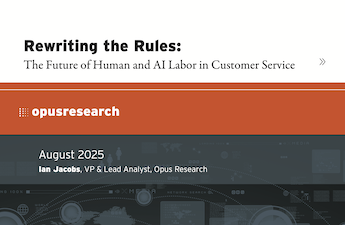
The latest Opus Research report, Rewriting the Rules: The Future of Human and AI Labor in Customer Service, digs deeper. The real shift isn’t just about who’s doing the work—it’s about how the work itself is changing. And we’re seeing clear evidence that AI is generating new kinds of jobs in the contact center. Not in some hazy five-years-out future. Right now.
This report includes exclusive interviews with customer service leaders (including Cognigy, TP, Verint, Accolade, ASAPP, and Observe.AI) to get a glimpse of how companies are already adapting to an industry in transition.
We’re seeing the rise of roles like Bot Manager, Prompt Engineer, Agentic Workflow Configurer, and AI Coach. These are positions that didn’t even exist a few years ago. Supervisors are turning into empathy coaches. WFM analysts are starting to look more like systems integrators. And agents? They’re trading repetitive scripts for real problem-solving and emotional intelligence.
These aren’t gimmicky titles for the sake of sounding futuristic. They’re concrete responses to how AI is reshaping workflows, expectations, and value. As automation handles the routine stuff, humans are being asked to do what they do best—navigate nuance, build trust, solve tough problems. And yes, provide human empathy.
That last bit matters more than ever. Because successful AI adoption isn’t just about tools and tech. It’s about people. One of the clearest lessons from this research is that the best outcomes happen when AI is deployed with—not on—agents.
Too many early rollouts dropped AI into the contact center like a surveillance drone. Unsurprisingly, agents weren’t thrilled. But when companies start with empathy, for example showing agents how AI helps them, inviting their input, giving them real ownership, adoption goes up. So does job satisfaction.
It’s time to stop thinking about AI as the end of human work and start seeing it as the next phase of it. A phase that’s already here, already evolving, and—if we do it right—actually more human than ever.
Featured Research Reports are available for clients and registered users only.
Click Here to View the Report Summary
For more information on becoming an Opus Research client or to purchase the report, please contact Peter Headrick (pheadrick@opusresearch.net, +1-415-505-2511).
Related
Categories: Featured Research, Conversational Intelligence, Intelligent Assistants, Intelligent Authentication, Articles
Related Articles

